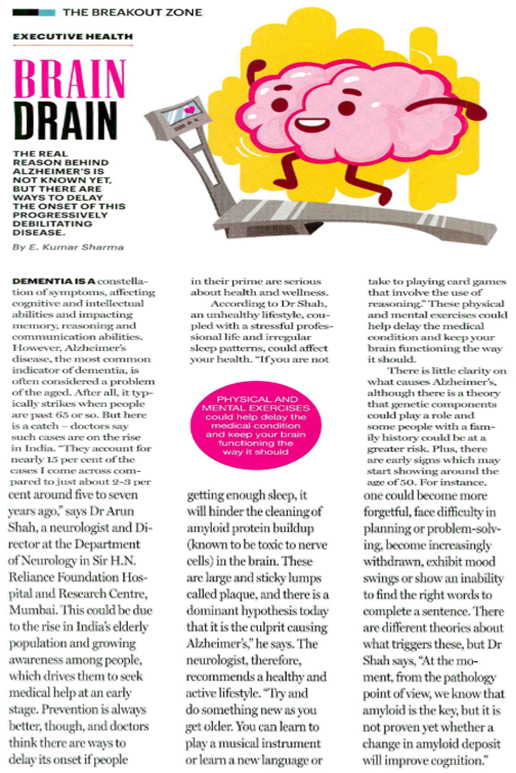Dear Guest,
We would be delighted to receive your feedback on our services.
Captcha * (case sensitive)
The real reason behind Alzheimer's is not known yet, but there are ways to delay the onset of this progressively debilitating disease.
Dementia is a constellation of symptoms, affecting cognitive and intellectual abilities and impacting memory, reasoning and communication abilities. However, Alzheimer's disease, the most common indicator of dementia, is often considered a problem of the aged. After all, it typically strikes when people are past 65 or so.
But here is a catch - doctors say such cases are on the rise in India. "They account for nearly 15 per cent of the cases I come across compared to just about 2-3 per cent around five to seven years ago," says Dr Arun Shah, a neurologist and Director at the Department of Neurology in Sir H.N. Reliance Foundation Hospital and Research Centre, Mumbai.
This could be due to the rise in India's elderly population and growing awareness among people, which drives them to seek medical help at an early stage. Prevention is always better, though, and doctors think there are ways to delay its onset if people in their prime are serious about health and wellness.
According to Dr Shah, an unhealthy lifestyle, coupled with a stressful professional life and irregular sleep patterns, could affect your health. "If you are not getting enough sleep, it will hinder the cleaning of amyloid protein buildup (known to be toxic to nerve cells) in the brain. These are large and sticky lumps called plaque, and there is a dominant hypothesis today that it is the culprit causing Alzheimer's," he says. The neurologist, therefore, recommends a healthy and active lifestyle. "Try and do something new as you get older. You can learn to play a musical instrument or learn a new language or take to playing card games that involve the use of reasoning." These physical and mental exercises could help delay the medical condition and keep your brain functioning the way it should.
There is little clarity on what causes Alzheimer's, although there is a theory that genetic components could play a role and some people with a family history could be at a greater risk. Plus, there are early signs which may start showing around the age of 50. For instance, one could become more forgetful, face difficulty in planning or problem-solving, become increasingly withdrawn, exhibit mood swings or show an inability to find the right words to complete a sentence. There are different theories about what triggers these, but Dr Shah says, "At the moment, from the pathology point of view, we know that amyloid is the key, but it is not proven yet whether a change in amyloid deposit will improve cognition."




RELIANCE FOUNDATION HOSPITAL Free Mobile App From

